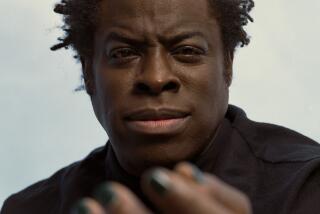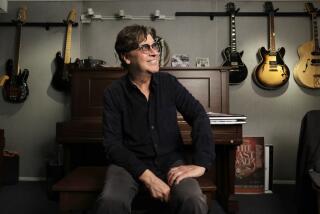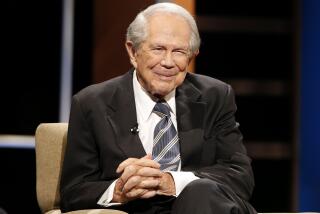Will Hollywood Say, Sorry, ‘Charly’?
- Share via
The voice is singsongy; the words, which pour forth in a breathless tumble, are enunciated but still slurred.
“My name is Charly--Charly Gordon--and I live in Boston. I work in a bakery and I play with the children in the playground. I mean I used ta play with the children, but then nobody showed up. They said I was too big, but I still go there, the playground, I mean. And I swing and I wave at them ‘cause they’re nice--the people, I mean.”
Baby boomers will immediately recognize the smiling figure on the playground swing, even if it is 30 years later and he’s part of a movie that’s still very much a dream.
Charly, the man-child who “grows up” overnight to become a marvel of modern science, is as much a part of the late ‘60s as Cool Hand Luke, Ratso Rizzo and split screen. Cliff Robertson, who played the character in a 1961 TV production (“The Two Worlds of Charly Gordon”) and took home the best actor Oscar for the 1968 feature (“Charly”), knows this. He has always known this.
Robertson calls Charly, who has the IQ of a 5-year-old, “the last of the innocents--he’s the little guy in all of us, the little guy who cries out for help.”
Getting Hollywood to acknowledge Charly’s continued hold on moviegoers has been a battle. The feeling is that “Charly,” which grossed a once-impressive $10 million and is often aired on TV, belongs to another era. Since its release, the argument goes, we have moved on to more clinical (read: less sentimental) portraits of mental illness, such as “Sling Blade.”
Robertson doesn’t buy this. To prove the skeptics wrong and show he still “looks the part” at age 72, he returned in November to South Boston with his Charly duds (bought at a Salvation Army store) and a 35-millimeter camera. He shot 15 minutes of opening material, which he says can later be spliced into what he envisions as a low-budget, high-interest sequel. The scenes--Charly with a new young friend, Charly saying his prayers, Charly jogging, Charly being “reborn” and embarking on an interracial romance--have been transferred to VHS tape. That tape is currently being shopped to independent production companies. Trimark Pictures, Robertson reports, “seemed very impressed” with the footage. (A Trimark executive said, “We’re looking at it . . . with interest. It’s still under consideration.”)
The actor likens his return to C Street, Charly’s address, to a religious pilgrimage.
“I took a page out of Muhammad and went to the mountain,” says Robertson, who has just finished acting in his 50th movie, “The Melting Pot,” with Paul Rodriguez and C.C.H. Pounder. “Instead of just sitting around and talking about it, I went back to Boston.”
On location, with the script distilled to its “very essence,” Robertson hired a skeleton crew and a local actress and her 6-year-old daughter. He paid for the five-day shoot himself. The scenes to come will show Charly at the bakery, coping with life in the ‘90s and falling in love.
“Some things have changed, the bakery is more high-tech,” Robertson says. “But Charly, now in his 60s, is still pushing a broom; he’s still guileless and naive--still the butt of jokes.”
And, of course, the smart Charly will awaken again, like a New Age Rip Van Winkle.
“I don’t want to give too much away,” says Robertson, who lives on Long Island, N.Y., but is now staying with friends in Sherman Oaks. “The audience will not be disappointed. Unlike ‘Charly,’ this one has a very upbeat ending and there’s a very strong, unusual love story.”
Although it was popular with audiences, “Charly” has never been a critics’ picture. Reviews at the time referred to it as mawkish and manipulative. Pauline Kael dismissed it as “a cheap fantasy with built-in sobs.”
Robertson allows that the original film, adapted from Daniel Keyes’ “Flowers for Algernon,” might be interpreted as mawkish, but he adds: “I have a whole bunch of reviews that are extremely good. It’s the old story: Which critics are you reading? I read some reviews of ‘Rain Man’ that were less than glowing. I also read a review of ‘Awakenings’ in which De Niro, my favorite actor, was compared to me in ‘Charly.’ ”
“Let’s just say the [naysayers] haven’t seen my ‘Charly.’ My ‘Charly’ is not that ‘Charly.’ I would hope that I could avoid some of [the original’s] pitfalls.”
To anyone who suggests that Charly no longer speaks to young audiences, Robertson has a ready reply: “It’s easy to be cynical in a world in which there is so much cynicism. There are so many heartless films now. ‘Charly 2’ is a little movie with a big heart and a big potential audience. There’s nothing high-tech or convoluted about it. It’s a film where people reach out and touch one another in the simplest human ways.”
It also can be shot for a pittance (well, under $6 million) and utilize Robertson’s talents as director, actor and writer. His hyphenated credits include the highly regarded “J.W. Coop” (1971), about an ex-con’s return to the rodeo circuit, and the little-known “The Pilot” (1979), about an alcoholic airline pilot.
“I’m a thrifty director--I work quickly and quietly. I could probably shoot the sequel for less. Between you and me, it could be made for $3 million to $4 million, but I would have to modify the story.”
Robertson’s determination brings to mind Robert Townsend, Billy Bob Thornton and other Young Turks who have taken the initiative and willed pet projects into being when the Hollywood establishment said, “Uh-uh, not interested.”
“You don’t have to be a 17-year-old zealot to wage guerrilla warfare,” Robertson points out. “[Jean] Cocteau was a guerrilla in his 70s. He was a poet, a director, an artist--a true Renaissance man. He did it all. Some of us, by nature, are intrigued by the challenge.”
But why, after all these years, another “Charly” picture? Does he feel a special kinship? Did he once know someone like Charly?
“No, nothing like that. There was never anybody in my family who was like Charly. I assimilated the character in a very organic way. I did a certain amount of reading on the subject [of mental retardation] and hired a young man named Johnny Dougherty as a sort of technical advisor. I found Johnny in a Staten Island shelter that taught basic manual skills. Sadly, he was killed [in a car crash] before we finished.”
The lifelong connection may have more to do with Charly’s status as ultimate “outsider.” Robertson, who apprenticed in theater and live TV, has deliberately dodged the Hollywood mainstream. He hates self-promotion and has never had a press agent. He resides in “the boonies” of Long Island--”my little Walden Pond”--and only returns to the West Coast to “say the words.”
In 1977, he found himself a whistle-blower in the David Begelman scandal. The Columbia Pictures president forged Robertson’s name to a $10,000 check in an attempt to hide funds he had embezzled. Speaking out at the time against the studio’s “creative bookkeeping” came at a high price: 3 1/2 years of ignored calls.
“I broke the unwritten commandment: Thou shalt never confront a major mogul on corruption. Suddenly, the phone stopped ringing. . . . I never intended to play Don Quixote--I thought [the check] was a simple computer mistake--and I don’t intend to go out looking for more windmills, I can tell you. I love making movies too much.”
So for the first time in his career, Robertson is taking lunches.
“It’s hard to find financing if you’re not part of the network . . . if you’re not eating and supping and manipulating in this town,” the actor observes with some exasperation. “It’s not my favorite pastime, but I can sit down and have lunch, if the situation demands.”
More to Read
Only good movies
Get the Indie Focus newsletter, Mark Olsen's weekly guide to the world of cinema.
You may occasionally receive promotional content from the Los Angeles Times.








